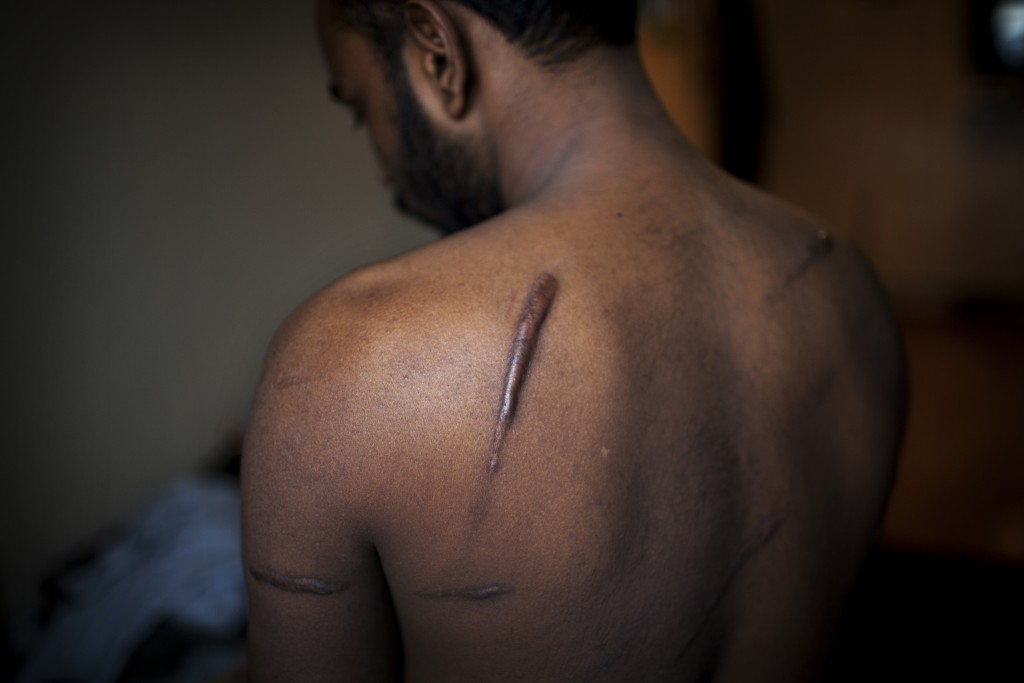An ethnic Tamil survivor of alleged torture at the hands of Sri Lankan security forces poses for a photograph in London, October 2012. Photo by Will Baxter.
New evidence has emerged that Sri Lanka’s security forces have perpetrated acts of torture and sexual violence against ethnic Tamils as recently as last year, according to a UK-based rights group.
In a report released Wednesday, Freedom From Torture (FFT) said that its doctors have documented 40 new cases of post-war torture and sexual abuse. Victims included both men and women.
“The overwhelming majority of these cases are ethnic Tamils, and the key factor that led to their detention and torture appears to be a real, or perceived, connection to the Liberation Tigers of Tamil Eelam (LTTE),” the report said.
“Our doctors are seeing first-hand that targeted torture continues in Sri Lanka,” Dr Juliet Cohen, FFT’s head of doctors, said in a press release. “We are treating individuals displaying physical and psychological consequences of torture techniques that regularly include suffocation and sexual torture … [and] ‘branding’ with hot metal rods — a technique that ensures an individual can be easily identified by the authorities in the future.”
Abhi, whose name has been changed to protect her anonymity, was detained for just over a week in February 2013. She was picked up by Sri Lanka’s notorious Criminal Investigation Department and held in a “darkened room where she was stripped naked, interrogated and beaten” according to her medical report, on file with FFT. “Over the next six days she was beaten with wires, sexually assaulted, raped, asphyxiated with petrol-covered cloth and threatened with death.”
Speaking Tuesday through an FFT interpreter, Abhi talked briefly about the abuse she suffered.
“I have many scars on my body. There are cigarette burns all over my back and some on my front too,” she said. “All the time in Sri Lanka Tamil women are raped, people disappear and are murdered. It is very wrong.”
Abhi is now in the UK where she is awaiting the outcome of her asylum claim.
“In one sense it’s good that I’m here … because in Sri Lanka my life is in danger. But I’m not yet secure, and I find it very difficult to relax,” she said.
In February 2012, Human Rights Watch (HRW) published a damning report containing detailed accounts of 75 cases of alleged rape and sexual abuse of Tamil men and women perpetrated by members of Sri Lanka’s army, police and pro-government paramilitary groups.
Communicating via email, HRW’s South Asia director Meenakshi Ganguly said that “rapes in custody remain a serious concern” in Sri Lanka.
The tiny South Asian nation has repeatedly rejected calls for an international investigation into war crimes allegedly committed during the finals phase of its civil war. In March, the UN’s Human Rights Council adopted a resolution to carry out an inquiry into offenses committed by both the Sri Lankan government and LTTE, however President Mahinda Rajapaksa has stated that the government will not allow UN investigators to enter the country.
Susan Munroe, Chief Executive of FFT, said that the UN’s Office of the High Commissioner for Human Rights (OHCHR) should “include a focus on ongoing torture” in its investigation if it is allowed to proceed.
“The forensic reports our doctors produce indicate strongly that torture is still very much part of the Sri Lankan’s government’s repression machinery almost five years after the end of conflict. This cannot be ignored,” Munroe said.
However, Sri Lanka’s cabinet spokesman Keheliya Rambukwella rejected the allegations of torture and abuse.
“This report is totally biased and [FFT] have their own agendas. They have anti-Sri Lankan elements and continue undue pressure on Sri Lanka by leveling baseless allegations,” he told ucanews.com.
Rambukwella also claimed that the “Sri Lankan government is very closely working with [the] UN” despite its refusal to allow outside investigators to enter the country.
Ganguly said that Sri Lanka’s government had “not only failed to comply” with an investigation, but had also “engaged in the intimidation of human rights activists” who were providing evidence to the OHCHR.
“Some were detained and questioned, others threatened,” she said. “This can have a chilling impact on those that wish to share their testimonies.”
“Surely, if the government has nothing to hide, it should welcome an independent investigation which will corroborate its claims?” she added.
A.E.G., a Tamil activist working in the former conflict zone who asked for his full name to be concealed, said there are “many complaints” of torture and sexual misconduct by the security forces in the Northern Province.
“The hundreds of ex-combatants live with fear after undergoing rehabilitation,” he said. “We all know we won’t get any justice from the government. But we have faith and hope in an international investigation.”
Since 2009, FFT has medically documented a total of 160 cases of individuals tortured since Sri Lanka’s civil war ended. Almost a quarter of all referrals to the organization are Sri Lankan nationals.
Of the new cases, 13 date from 2013, 10 from 2012, seven from 2011, two from 2010 and eight go back as far as 2009.
Additional reporting by ucanews.com reporter in Colombo. This story originally appeared on ucanews.com and appears on Groundviews as part of a content sharing agreement.
